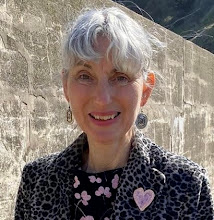Final week - Domestic or fireside goddesses
A household deity is a deity or spirit that protects the home, looking
after the entire household or certain key members. It has been a common belief in pagan religions as well as in folklore across many parts of the world.
 Household deities fit into two types; firstly, a
specific deity- typically a goddess-
often referred to as a hearth goddess or domestic goddess who is associated with the home
and hearth, with examples including the Greek Hestia and Norse Frigg.
Household deities fit into two types; firstly, a
specific deity- typically a goddess-
often referred to as a hearth goddess or domestic goddess who is associated with the home
and hearth, with examples including the Greek Hestia and Norse Frigg.
Household deities were usually worshipped not in
temples but in the home, where they would be represented by small idols (such as the teraphim of the Bible, often translated as "household gods" in Genesis 31:19
for example), amulets, paintings or reliefs.
Lakshmi is worshipped daily in Hindu homes and commercial
establishments as the goddess of wealth.
The festivals of Diwali and Kojagiri Purnima are celebrated in her honour. Lakshmi
is the household goddess of most Hindu families, and a favourite of women.
Diwali popularly
known as the "festival of lights," is a five day festival that
falls between mid-October and mid-November. (2012 Diwali
starts on 13th November.)
The name "Diwali" or "Divali" is a
contraction of "Deepavali" (Sanskrit: दीपावली Dīpāvalī), which translates into
"row of lamps". Diwali
involves the lighting of small clay lamps filled with oil to signify the
triumph of good over evil. These
lamps are kept on during the night and one's house is cleaned, both done in
order to make the goddess Lakshmi feel welcome. Firecrackers are burst because it is
believed that it drives away evil spirits. During Diwali, all
the celebrants wear new clothes and share sweets and snacks with family
members and friends. The third day of Diwali, marks the worship of Lakshmi, the goddess of wealth.
We discussed what "wealth" might mean and decided it had little to do with income. We wrote about our inner goddess and re-read Ruth Fainlight's poem that acted as a sort of keynote for this series:
Gloria
Ruth
Fainlight
(an extract)
However she’s personified
Or represented,
I won’t forget
Can easily contain
A million goddesses or concepts.
As a final sweet treat - all the winter festivals seem to involve eating - we discussed the history of the great Be-Ro cook book. Here's a classic recipe:
|
|
||||||||||||||||||||||||||||||||||||||||||||
|
Bake in moderate oven 180 C 350 F Gas 4 for about 30 mins.
When cold sandwich and cover with
chocolate icing
as follows:
60g (2½ oz) butter
2 tablespoons cocoa
45 ml (3 tblsp) hot milk
5 ml (1 tspn) vanilla essence
Soften butter, blending in cocoa, then stir in
icing sugar, milk and essence.
Beat until smooth and thick.
Note from Sally:
For a more grown-up taste I substitute one ounce of sugar for an
extra ounce of cocoa in the cake mix and I use light muscovado rather than
white caster sugar. I also use quite a bit of vanilla extract – a generous half
teaspoonful.
Happy winter festivals!
Next series starts Friday January 11th 2013 - as before.



















